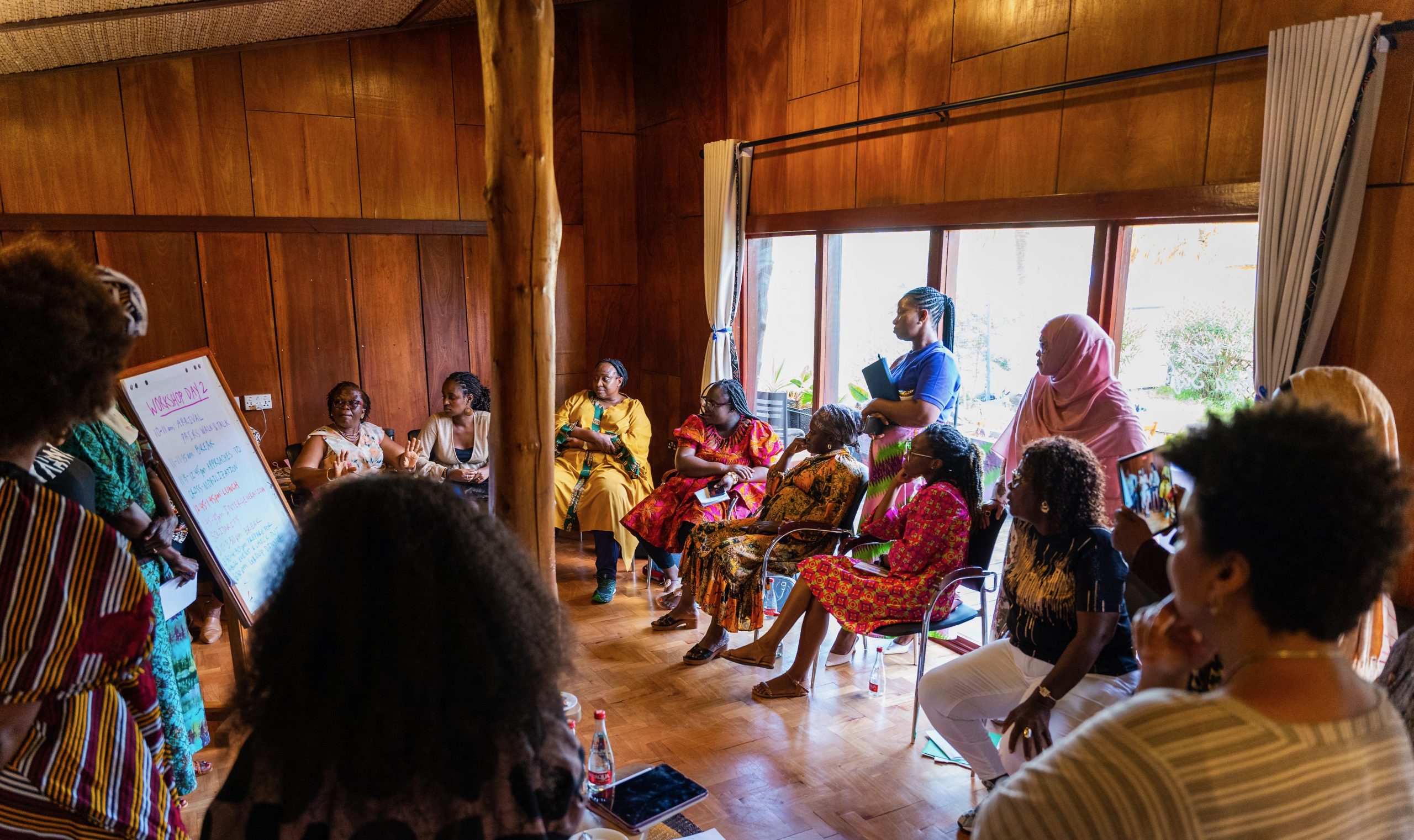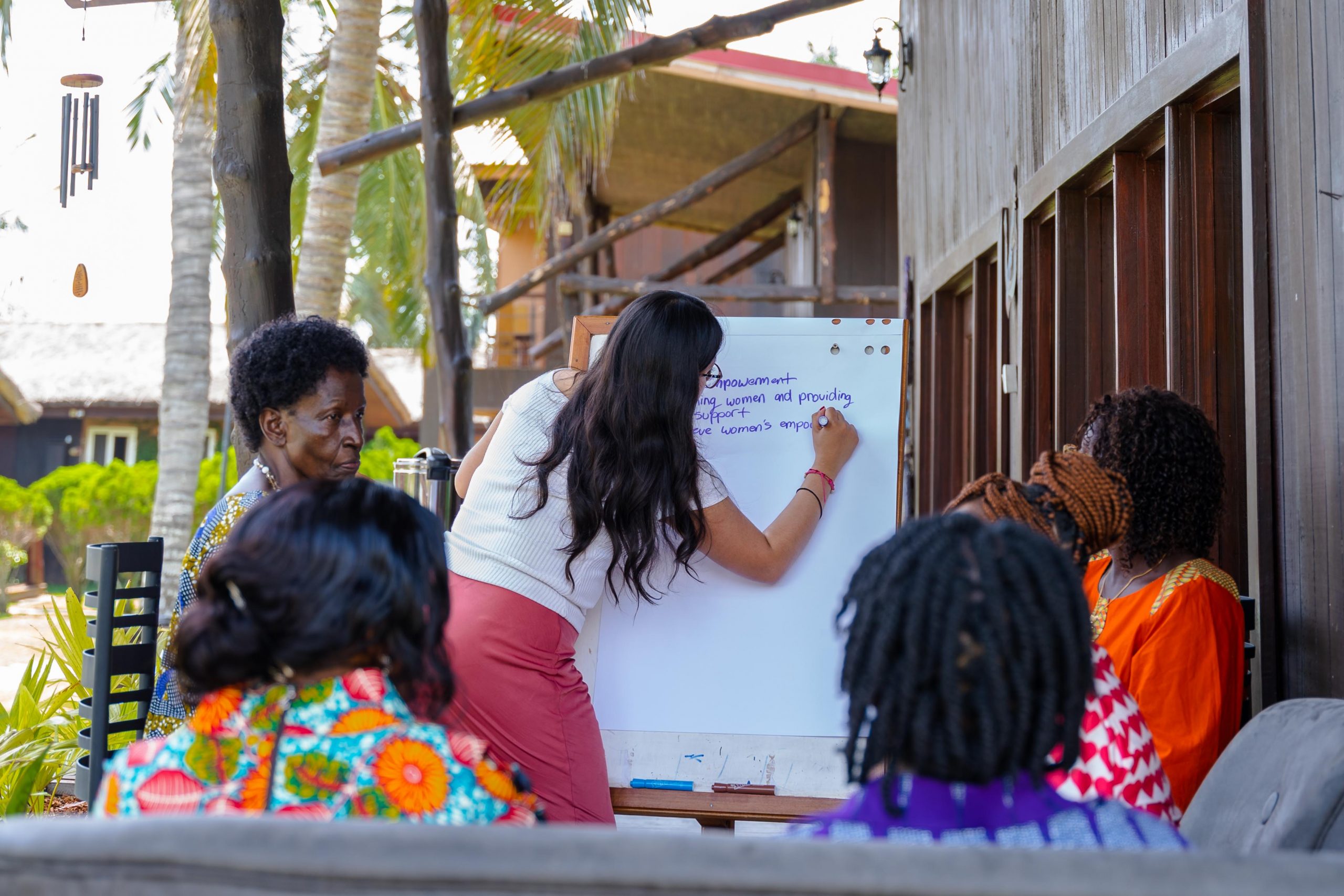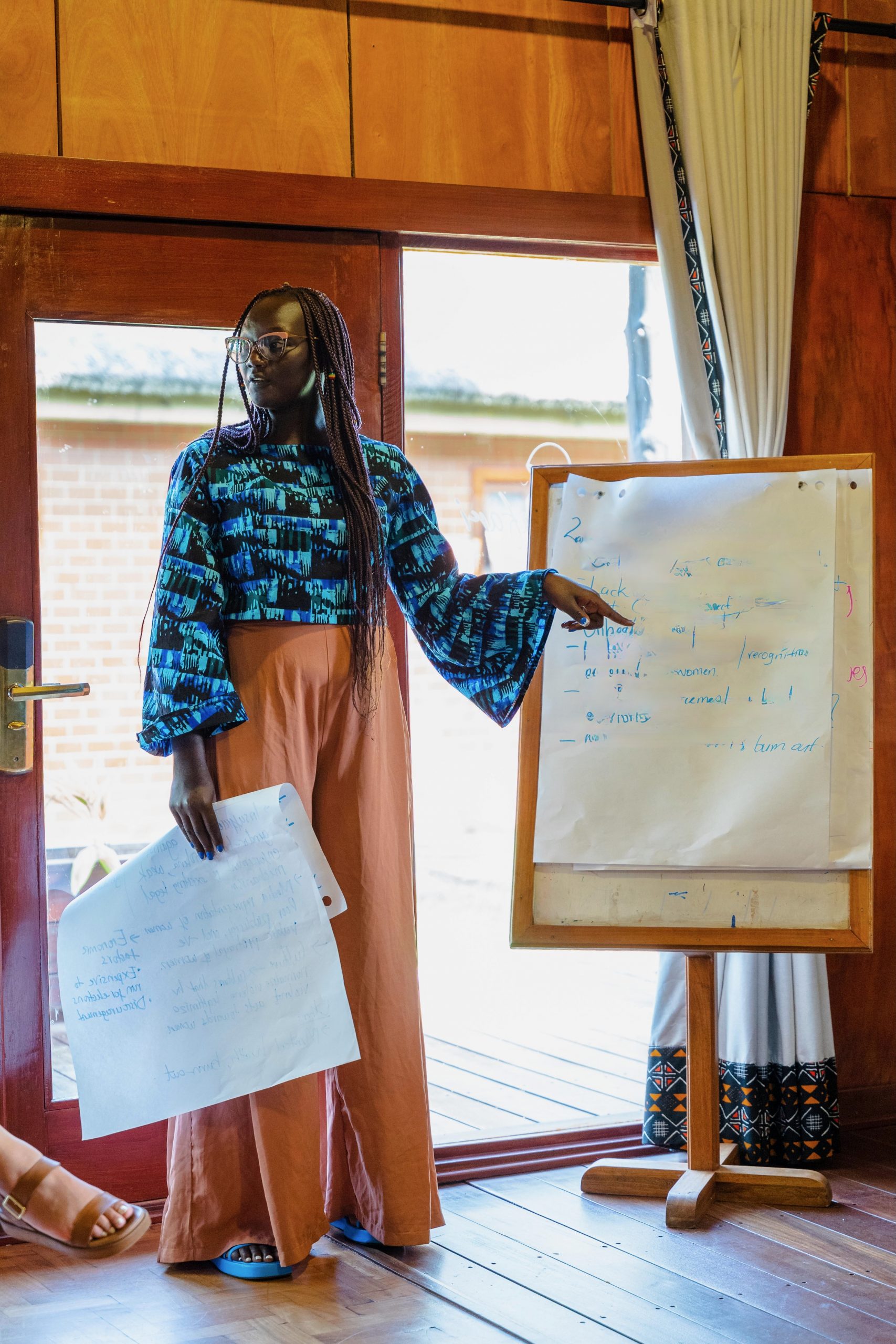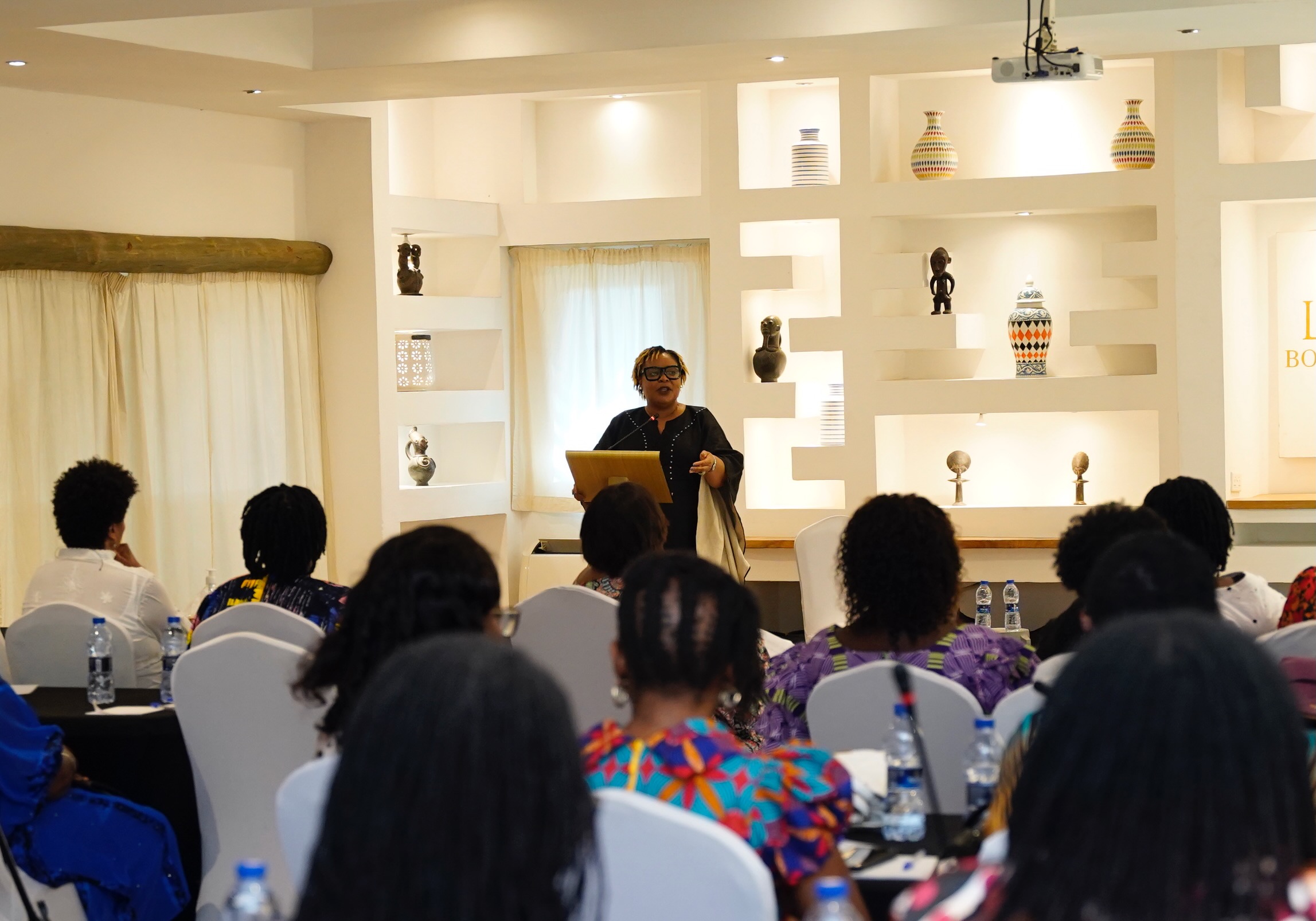CUNY Law and Brooklyn College’s Institute convened regional experts, movement leaders, and policymakers at a November 2024 Global Forum in Ghana, documented by CUNY student fellows.
BY IGLTP STAFF

A Global Forum workshop session in Ghana. The forum brought together experts from six countries that have all experienced uncertainty and violence around elections — Nigeria, Liberia, Sierra Leone, Ghana, South Sudan, and Kenya — as well as regional facilitators from Uganda, South Africa, and Kenya. The participants’ areas of expertise include human rights, peacebuilding, freedom of information and free speech, women’s political participation, gender-based violence, law and legal policy, and youth organizing. Photo Credit: Illuminous Photography
Around the world, gender justice movements are leading critical conversations about various forms of violence often present during electoral seasons, ranging from gender-based violence to misinformation to physical and structural harms. The City University of New York’s Institute on Gender, Law, and Transformative Peace (IGLTP) is supporting gender justice movements worldwide as they navigate heightened electoral cycles through innovative research and convenings. IGLTP brought resources and attention to these issues through its recent multinational forum in Ghana from November 1-3, 2024. The Institute and its student fellows convened leading experts, movement leaders, and policymakers to explore cross-mobilization strategies that counter electoral violence as a form of peace work.
The Institute’s forum created an intergenerational space for women leaders to engage in cross-country dialogue exploring notions of peace and political mobilization — in light of current and upcoming elections. Participants shared challenges they are facing across the region, including political upheaval, barriers to women’s political participation, voter intimidation and suppression, and gender-based violence.
The Institute is a joint partnership between CUNY School of Law and Brooklyn College formally established in October 2023; its mission is to reimagine policymaking from the perspective of social movements. This year’s convening was IGLTP’s second Global Forum, bringing together collaborators from six countries that have all experienced uncertainty and violence around elections — Nigeria, Liberia, Sierra Leone, Ghana, South Sudan, and Kenya — as well as regional facilitators from Uganda, South Africa, and Kenya. The participants’ areas of expertise include human rights, peacebuilding, freedom of information and free speech, women’s political participation, gender-based violence, law and legal policy, and youth organizing.

IGLTP Student Fellow Diana Reyes (Brooklyn College ’25) captures a break-out group’s discussion of challenges faced and strategies employed by gender justice movements in Sierra Leone and Liberia.
Photo Credit: Illuminous Photography
One expert workshop participant, Ms. Bintu Kamara, serves as the Project Officer at the 50/50 Group in Sierra Leone. The 50/50 Group advocates for gender parity and increased political participation of women through capacity building trainings and community-based networks of women. During the forum, Ms. Kamara shared strategies and reflections on issues preventing women from accessing decision-making spaces. “In Sierra Leone, we’ve noticed issues around political intimidation, electoral violence, and marginalization of women — all of this contributes to limiting women’s participation in politics. So [50/50 has set up] women’s community solidarity groups, [through which] we try to see that these women identify initiatives within their communities on how to address issues around violence, conflict or whatever makes the community unstable for them as women.”
Ms. Hafsah Sey Sumani, Head of Program and Policy Influencing at NORSAAC in Northern Ghana, spoke of her work to empower women and youth in areas including social protection, peace and security, health, and education. “We facilitate programs and movement building of young girls,” including trainings for leadership positions and advocacy within their communities. She explained how NORSAAC convenes young people to the Girls Advisory Council, and gives them tools to advocate for community service provision with civil society organizations and government institutions. “The girls engage service providers—like water companies, electricity companies, and the Ghana Education Service—around access to the services they provide to these communities, especially the ones that affect women.” Ms. Sumani spoke of one of the Council’s memberships, which “has grown from an association to a movement; they are really effective when it comes to engaging stakeholders and mobilizing [more] young girls in the rural and urban communities.”

Expert workshop participant, Ms. Joyce Diko Duku Tikaya, presents on her country, South Sudan, during the Global Forum. Ms. Tikaya is the founder of the Lady in Action (LIA) program, a community space for young women to challenge patriarchal stereotypes.
Photo Credit: Illuminous Photography
The knowledge shared and connections formed during the Global Forum set the stage for further strategy sharing and cross-border engagement.
Three CUNY students—Sandrine Sugi (CUNY Law ’26), Francesca Phanius (Brooklyn College ’25), and Diana Reyes (Brooklyn College ’25)—comprised the Institute’s inaugural cohort of its fellowship program focusing on documentation and the Global Forum. Throughout Fall 2024, the student fellows received training in participatory research methods and documentation. In Ghana, they captured critical documentation of the wisdom and strategies shared by expert participants.
The forum concluded with a dynamic event co-sponsored by the African Women’s Development Fund, convening journalists, feminist leaders, policymakers, and international workshop participants. IGLTP Executive Director and Nobel Peace Laureate Leymah Gbowee began the program with keynote remarks, reflecting on themes and strategies discussed during the workshop—including the targeting of gender justice activists during times of conflict and elections. “Through it all, women have stood tall, as they always do,” Ms. Gbowee remarked.
The Nobel Laureate was then joined by an esteemed panel of experts to discuss themes including regional coalition-building and solidarity across feminist movements—which, in turn, have enabled women to counter violence. As Ms. Gbowee stated, “Tonight is for sharing strategies… and today would not have been possible if my past had not collided with my present. I think the reason why it’s that way is because we built a movement that is exceptional. The sisters that we work with make it easy for us to do cross-border engagement.”

IGLTP Executive Director and Nobel Peace Laureate Leymah Gbowee addresses the audience at the Nov. 3 culminating event, consisting of the international workshop group and many leading Ghanaian policymakers, movement leaders, and political organizers. She was later joined by esteemed panelists Mrs. Joana Opare, (Board Member, National Peace Council in Ghana); Oheneyere Gifty Anti (journalist and host of The Standpoint in Ghana); and Ms. Daisy Amdany (Executive Director of the Community Advocacy and Awareness (CRAWN) Trust in Kenya); the conversation was moderated by Dr. Esther Ofei Aboagye (Chairperson of the Alliance for Reproductive Health Rights Advisory Board in Ghana). Photo Credit: Illiminous Photography
The knowledge shared and connections formed during the forum set the stage for further strategy sharing and cross-border engagement. Visit the Institute’s website this winter for more in-depth analysis of the multinational forum, including upcoming blog posts authored by the CUNY student fellows on strategies and insights put forward by the forum participants.

The forum workshop expert participants, facilitators, and IGTLP staff and student fellows.
Photo Credit: Illuminous Photography
